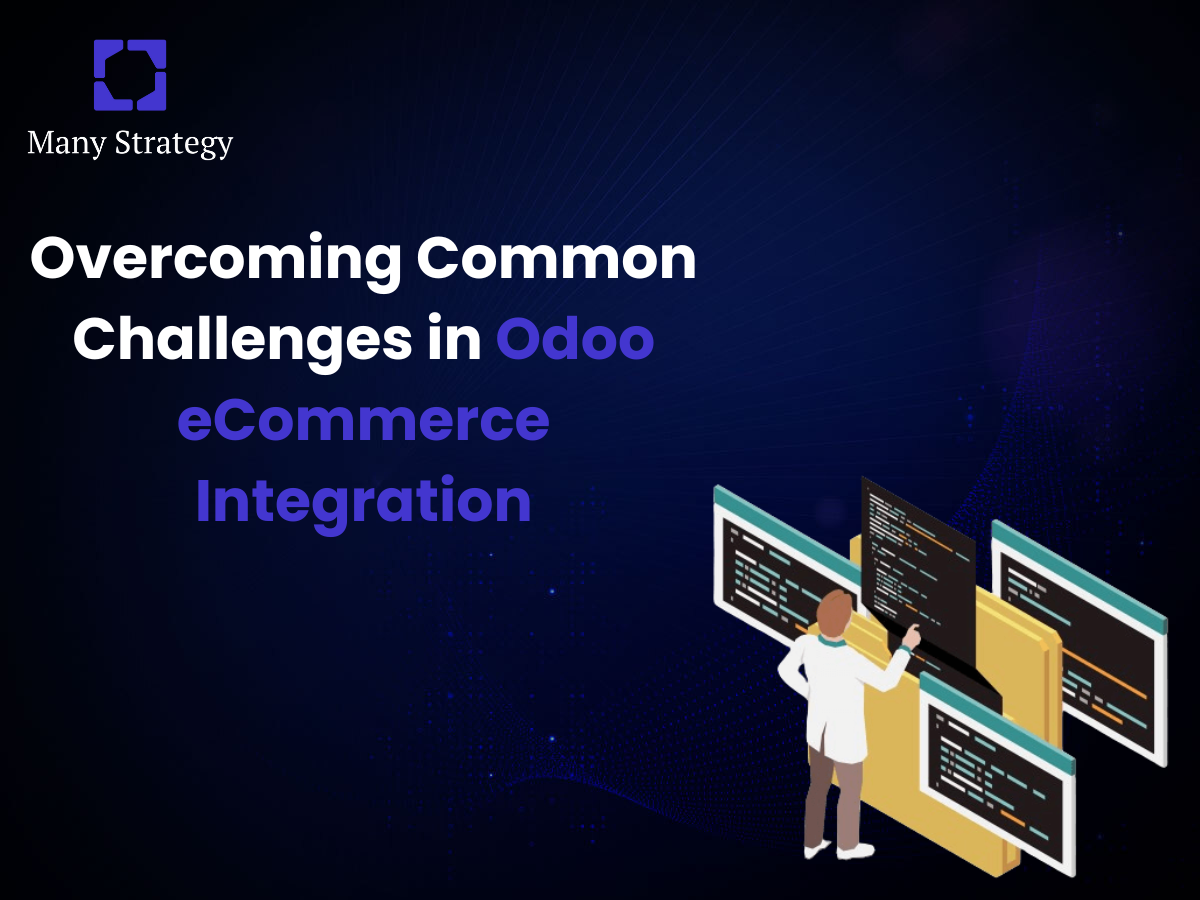In the digital age, where online commerce reigns supreme, businesses of all sizes are turning to powerful ERP systems to streamline operations and enhance customer experiences. Odoo, a versatile and robust ERP platform, has emerged as a popular choice for integrating eCommerce functionalities. However, like any comprehensive system, Odoo eCommerce integration comes with its own set of challenges. In this post, we’ll explore common hurdles faced during Odoo eCommerce integration and provide practical solutions to overcome them. Along the way, we’ll highlight the importance of custom odoo apps development, the role of an openerp consultant, and how Odoo consulting services can ensure a seamless integration experience.
Understanding the Need for Odoo eCommerce Integration
Before diving into the challenges, it’s crucial to understand why businesses choose Odoo for their eCommerce needs. Odoo offers an all-in-one platform that integrates various business functions—sales, inventory, accounting, and customer relationship management (CRM)—into a single, unified system. For businesses looking to enhance their online presence, Odoo eCommerce provides a seamless way to manage all operations under one roof. However, this level of integration often requires careful planning, execution, and ongoing support.
Common Challenges in Odoo eCommerce Integration
1. Data Migration and Synchronization
One of the most common challenges businesses face during Odoo eCommerce integration is data migration and synchronization. Migrating data from existing systems to Odoo can be a complex process, especially when dealing with large volumes of information. Inconsistent data formats, duplicate entries, and data loss are potential risks that can disrupt business operations.
Solution: To overcome this challenge, it’s essential to work with experienced Odoo development services that specialize in data migration. They can ensure that all data is accurately transferred, cleaned, and synchronized across all modules. Utilizing Odoo’s built-in data migration tools can also streamline the process and reduce the risk of errors.
2. Customization and Flexibility
Odoo is known for its flexibility and customization options, allowing businesses to tailor the platform to their specific needs. However, excessive customization can lead to compatibility issues and complicate future upgrades. Striking the right balance between customization and maintaining the integrity of the core system is often a challenge.
Solution: Engaging an Odoo consultant with deep knowledge of Odoo’s architecture is key to achieving the right level of customization. These experts can help you determine which customizations are necessary and how to implement them without compromising the system’s stability. Additionally, they can guide you on best practices for maintaining custom modules during updates.
3. Integration with Third-Party Applications
Many businesses rely on third-party applications for specific functions, such as payment gateways, shipping services, or marketing tools. Integrating these applications with Odoo can be challenging, particularly if the third-party software isn’t fully compatible with Odoo.
Solution: To tackle this issue, it’s advisable to utilize odoo integration api offered by experienced providers. These services can ensure that third-party applications are seamlessly integrated with Odoo, using APIs and custom connectors. Odoo consultants can also recommend alternative solutions if certain applications are incompatible, ensuring that your business operations remain uninterrupted.
4. Performance Optimization
As your eCommerce operations grow, the performance of your Odoo system becomes increasingly critical. Slow load times, inefficient database queries, and server overload can negatively impact the user experience and, ultimately, your bottom line.
Solution: Optimizing the performance of your Odoo eCommerce platform requires a proactive approach. Regular performance audits, conducted by Odoo consulting services, can identify bottlenecks and areas for improvement. Implementing caching mechanisms, optimizing database queries, and upgrading server infrastructure are some of the strategies that can enhance system performance. Additionally, working with an Odoo ERP consultant can help you forecast future performance needs and scale your system accordingly.
5. User Training and Adoption
Even with a perfectly integrated Odoo eCommerce system, businesses may struggle with user adoption. Employees may find it challenging to adapt to the new system, leading to inefficiencies and errors in day-to-day operations.
Solution: Comprehensive training and support are essential for successful user adoption. Odoo development services often include training sessions tailored to your team’s needs, ensuring that all users are comfortable navigating the new system. Additionally, providing ongoing support and resources can help address any issues that arise, ensuring a smooth transition and sustained productivity.
The Role of Odoo Development Services in Overcoming Integration Challenges
Odoo development play a pivotal role in overcoming the challenges associated with Odoo eCommerce integration. These services offer end-to-end solutions, from initial planning and customization to ongoing support and optimization. By partnering with experts in Odoo ERP development, businesses can ensure a smooth and successful integration process.
One of the key advantages of working with professional Odoo implementation is their ability to provide tailored solutions. Every business is unique, and a one-size-fits-all approach rarely works in ERP integration. Experienced developers can assess your specific needs, recommend the most suitable modules, and customize the platform to align with your business processes.
The Future of Odoo ERP: What Lies Ahead?
As businesses continue to evolve and adapt to the digital landscape, the future of Odoo ERP looks promising. With advancements in technology and the increasing demand for integrated solutions, Odoo is constantly evolving to meet the needs of modern businesses. The introduction of AI-powered features, enhanced mobile accessibility, and more robust security measures are just a few examples of how Odoo is positioning itself as a leader in the ERP space.
For businesses considering Odoo eCommerce integration, staying informed about the future of Odoo ERP is crucial. Partnering with an Odoo ERP consultant who is well-versed in emerging trends can provide valuable insights and help you make informed decisions that will benefit your business in the long run.
Conclusion
Odoo eCommerce integration offers numerous benefits, but it also presents several challenges that require careful planning and execution. By addressing common challenges such as data migration, customization, third-party integration, performance optimization, and user adoption, businesses can maximize the potential of their Odoo eCommerce platform.
Working with experienced Odoo consulting services and Odoo development services is key to overcoming these challenges and ensuring a successful integration. As the future of Odoo ERP continues to unfold, businesses that invest in the right resources and expertise will be well-positioned to thrive in the competitive eCommerce landscape.
Whether you’re just starting your Odoo eCommerce journey or looking to optimize an existing system, the support of an Odoo ERP consultant can make all the difference. With the right guidance and solutions, your business can fully leverage the power of Odoo and achieve long-term success in the digital marketplace.










